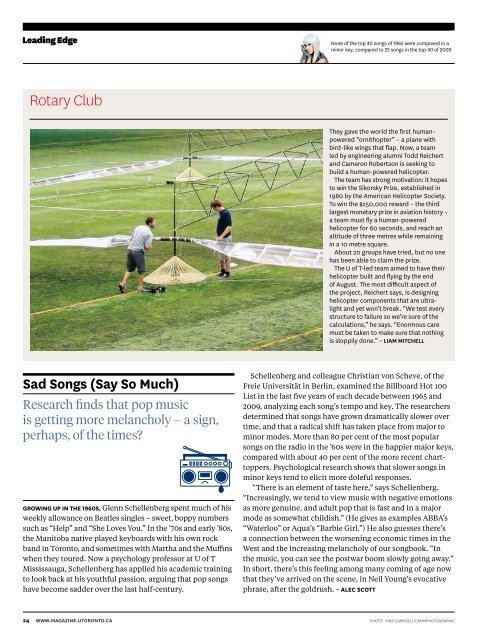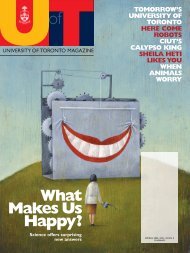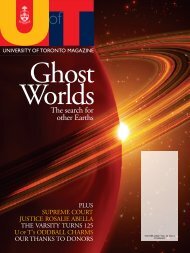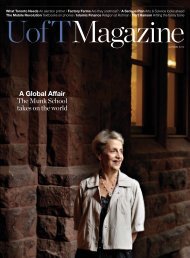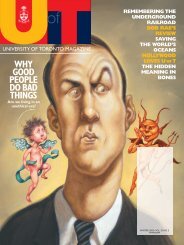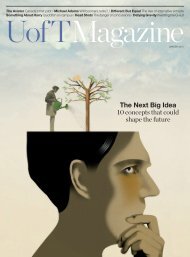8 MB - University of Toronto Magazine
8 MB - University of Toronto Magazine
8 MB - University of Toronto Magazine
- No tags were found...
Create successful ePaper yourself
Turn your PDF publications into a flip-book with our unique Google optimized e-Paper software.
Leading Edge<br />
None <strong>of</strong> the top 40 songs <strong>of</strong> 1965 were composed in a<br />
minor key, compared to 22 songs in the top 40 <strong>of</strong> 2009<br />
Rotary Club<br />
They gave the world the first humanpowered<br />
“ornithopter” – a plane with<br />
bird-like wings that flap. Now, a team<br />
led by engineering alumni Todd Reichert<br />
and Cameron Robertson is seeking to<br />
build a human-powered helicopter.<br />
The team has strong motivation: it hopes<br />
to win the Sikorsky Prize, established in<br />
1980 by the American Helicopter Society.<br />
To win the $250,000 reward – the third<br />
largest monetary prize in aviation history –<br />
a team must fly a human-powered<br />
helicopter for 60 seconds, and reach an<br />
altitude <strong>of</strong> three metres while remaining<br />
in a 10 metre square.<br />
About 20 groups have tried, but no one<br />
has been able to claim the prize.<br />
The U <strong>of</strong> T-led team aimed to have their<br />
helicopter built and flying by the end<br />
<strong>of</strong> August. The most difficult aspect <strong>of</strong><br />
the project, Reichert says, is designing<br />
helicopter components that are ultralight<br />
and yet won’t break. “We test every<br />
structure to failure so we’re sure <strong>of</strong> the<br />
calculations,” he says. “Enormous care<br />
must be taken to make sure that nothing<br />
is sloppily done.” – Liam Mitchell<br />
Sad Songs (Say So Much)<br />
Research finds that pop music<br />
is getting more melancholy – a sign,<br />
perhaps, <strong>of</strong> the times<br />
Growing up in the 1960s, Glenn Schellenberg spent much <strong>of</strong> his<br />
weekly allowance on Beatles singles – sweet, boppy numbers<br />
such as “Help” and “She Loves You.” In the ’70s and early ’80s,<br />
the Manitoba native played keyboards with his own rock<br />
band in <strong>Toronto</strong>, and sometimes with Martha and the Muffins<br />
when they toured. Now a psychology pr<strong>of</strong>essor at U <strong>of</strong> T<br />
Mississauga, Schellenberg has applied his academic training<br />
to look back at his youthful passion, arguing that pop songs<br />
have become sadder over the last half-century.<br />
Schellenberg and colleague Christian von Scheve, <strong>of</strong> the<br />
Freie Universität in Berlin, examined the Billboard Hot 100<br />
List in the last five years <strong>of</strong> each decade between 1965 and<br />
2009, analyzing each song’s tempo and key. The researchers<br />
determined that songs have grown dramatically slower over<br />
time, and that a radical shift has taken place from major to<br />
minor modes. More than 80 per cent <strong>of</strong> the most popular<br />
songs on the radio in the ’60s were in the happier major keys,<br />
compared with about 40 per cent <strong>of</strong> the more recent charttoppers.<br />
Psychological research shows that slower songs in<br />
minor keys tend to elicit more doleful responses.<br />
“There is an element <strong>of</strong> taste here,” says Schellenberg.<br />
“Increasingly, we tend to view music with negative emotions<br />
as more genuine, and adult pop that is fast and in a major<br />
mode as somewhat childish.” (He gives as examples ABBA’s<br />
“Waterloo” or Aqua’s “Barbie Girl.”) He also guesses there’s<br />
a connection between the worsening economic times in the<br />
West and the increasing melancholy <strong>of</strong> our songbook. “In<br />
the music, you can see the postwar boom slowly going away.”<br />
In short, there’s this feeling among many coming <strong>of</strong> age now<br />
that they’ve arrived on the scene, in Neil Young’s evocative<br />
phrase, after the goldrush. – Alec Scott<br />
24 WWW.MAGAZINE.UTORONTO.CA<br />
photo: Mike Campbell/ckmmphotographic


